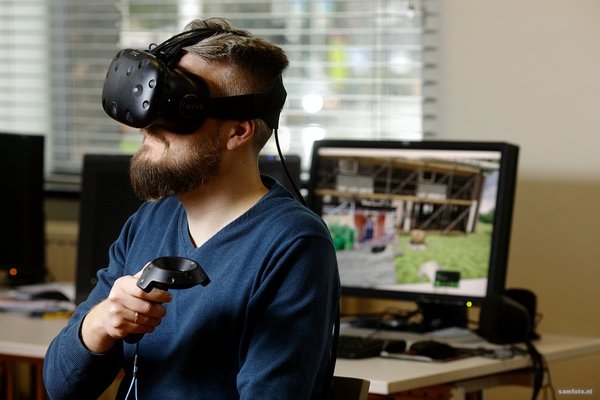Choosing a new kitchen in virtual reality
In Arno Freeke’s VR Lab, you can try out endless colours and cabinets in a virtual version of your house.
Virtual reality (VR) is certainly no longer the exclusive domain of the gaming world. There are endless other applications for VR, the technology in which a computer simulates an environment with 3D objects and 360-degree images. Psychologists use VR to treat patients suffering from PTSD, for example, and surgeons use it to visualise operations.
The Faculty of A+BE is home to one of the country’s leading academic labs for visual representation, offering everything from urban design and visualisation tools to design methods. However, coordinator Arno Freeke sees VR primarily as an important communication tool.
For example, a housing corporation commissioned the lab to simulate the consequences of a major renovation project. ‘We collaborated with researcher Clarine van Oel to ‘build’ houses. In a virtual world, residents experienced how the planned work would affect them’. Residents entered their future environment virtually, complete with scaffolding and a trench in front of their door. ‘Including the noise from drilling, digging and piling. This helped manage their expectations and address concerns’. Freeke and his colleagues also developed a module for the housing corporation allowing residents to choose a new kitchen in their virtual home.

‘What’s great about VR is that it makes things intelligible and tangible, so that people can make choices without taking risks. In VR, replacing a kitchen is easy of course’. (Photo: Sam Rentmeester)
Next to offering interior design support, the lab advises on property matters within TU Delft as well as on course programme development. The team is keen to develop a setting for the Faculty of Aerospace Engineering that will challenge students to locate the black box from a crashed plane in a field. ‘VR offers us a range of possibilities at various scales’, explains Freeke. ‘You can replicate everything in actual size, or make things as small as Madurodam, which makes it ideal for area development’.
In late December, the lab collaborated with researcher Stefan van der Poel to replicate Paddepoel – a neighbourhood in Groningen – to analyse traffic flows. Speaking of Groningen: ‘You could also use VR to investigate the damage caused by the earthquakes’, says Freeke, thinking aloud.